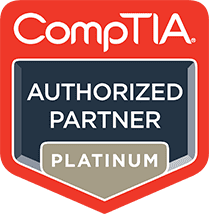BONUS! Cyber Phoenix Subscription Included: All Phoenix TS students receive complimentary ninety (90) day access to the Cyber Phoenix learning platform, which hosts hundreds of expert asynchronous training courses in Cybersecurity, IT, Soft Skills, and Management and more!
Course Overview
Phoenix TS A+ accelerated course provides participants with the knowledge base for taking the A+ certification exam. The course involves hands on training on a computer’s hardware and operating systems. Participants will gain the skills needed to comprehend the fundamentals of PC technology, PC networking, and PC security.
Our 5-day instructor-led A+ training and certification boot camp in Washington, DC Metro, Tysons Corner, VA, Columbia, MD or Live Online is ideal for someone in the early stages of their IT career. It covers:
- Basic computer hardware
- PC installation & configuration
- Networking & connectivity
- Laptop, mobile device & printer maintenance
- Operating systems
- Security
This course will prepare you for both parts of the A+ Certification exam.
There are no prerequisites for this course. However, it is recommended that you have basic knowledge of computing concepts and experience using computers that run on a Windows operating system before enrolling in this course.
Schedule
CompTIA A+
date
location
price
![[image]](https://phoenixts.com/wp-content/themes/phoenixts-com-new/assets/images/temp/image-9@2x.jpg)
Not seeing a good fit?
Let us know. Our team of instructional designers, curriculum developers, and subject matter experts can create a custom course for you.
Learn more about custom training
Program Level
Intermediate
Training Delivery Methods
Group Live
Duration
5 Days / 40 hours Training
CPE credits
33 NASBA CPE Credits
Field of Study
Information Technology
Advanced Prep
N/A
Course Registration
Candidates can choose to register for the course by via any of the below methods:
- Email: Sales@phoenixts.wpenginepowered.com
- Phone: 301-582-8200
- Website: www.phoenixts.wpenginepowered.com
Upon registration completion candidates are sent an automated course registration email that includes attachments with specific information on the class and location as well as pre-course study and test preparation material approved by the course vendor. The text of the email contains a registration confirmation as well as the location, date, time and contact person of the class.
Online enrolment closes three days before course start date.
On the first day of class, candidates are provided with instructions to register with the exam provider before the exam date.
Complaint Resolution Policy
To view our complete Complaint Resolution Policy policy please click here: Complaint Resolution Policy
Refunds and Cancellations
To view our complete Refund and Cancellation policy please click here: Refund and Cancellation Policy
Course Outline
Introduction
- Course setup
- A+ Certification skills inventory
Chapter 1: Troubleshooting
- Module A: Troubleshooting theory
- Module B: Safety
- Module C: Environmental factors
Chapter 2: Motherboards and CPUs
- Module A: Motherboards
- Module B: CPUs
Chapter 3: Computer power supplies
- Module A: Power supply connectors
- Module B: Power supply installation
- Module C: Power supply troubleshooting
Chapter 4: Memory
- Module A: Read-only memory
- Module B: Random access memory
Chapter 5: Computer expansion
- Module A: Expansion interfaces
- Module B: Expansion card installation
Module C: Connectors and cables
Chapter 6: Physical storage
- Module A: Disk drives
- Module B: RAID storage
- Module C: Optical drives
- Module D: Other storage methods
Chapter 7: Input-output devices
- Module A: Input devices
- Module B: Display output devices
- Module C: Display management
- Module D: Other input and output devices
Chapter 8: Printers and multi-function print devices
- Module A: Printer technologies
- Module B: Printer installation and maintenance
- Module C: Printer troubleshooting
Chapter 9: Operating systems
- Module A: Windows versions and features
- Module B: Non-Windows operating systems
- Module C: Operating system installation and upgrades
- Module D: Applications and scripting
Chapter 10: Operating system management
- Module A: Operating system features and tools
- Module B: Control Panel utilities
- Module C: Command-line utilities
- Module D: Operating system troubleshooting
Chapter 11: Network basics
- Module A: Classifying networks
- Module B: Network devices
- Module C: Internet connections
Chapter 12: Network cables and connectors
- Module A: Twisted-pair connections
- Module B: Coaxial connections
- Module C: Optical media
Chapter 13: Network protocols
- Module A: TCP/IP settings
- Module B: Transport protocols
- Module C: Application protocols
Chapter 14: Wireless networking
- Module A: Wireless technology
- Module B: Wi-Fi standards
Chapter 15: Windows networking
- Module A: Network shares
- Module B: Network connections
- Module C: Connection troubleshooting
Chapter 16: Virtualization and cloud computing
- Module A: Virtualization
- Module B: Cloud computing
Chapter 17: Mobile devices
- Module A: Mobile device types
- Module B: Mobile device configuration
- Module C: Mobile device troubleshooting
Chapter 18: Security principles
- Module A: Threats and vulnerabilities
- Module B: Security controls
Chapter 19: Security technologies
- Module A: Operating system security
- Module B: Security hardware and software
Chapter 20: Securing devices and data
- Module A: Workstation security
- Module B: Mobile device security
- Module C: Security troubleshooting
Chapter 21: Securing networks
- Module A: SOHO router features
- Module B: Network security
Chapter 22: Operational procedures
- Module A: Professionalism
- Module B: IT operations
- Module C: Incident response
- Module D: Backup and recovery
Appendix A: Glossary
Exam Information
[expandable_content]
A+ Certification Exam Details:
To earn the A+ Certification, candidates must pass two exams:
- The Essentials Exam (220-1001): Mobile devices, networking technology, hardware, virtualization and cloud computing and network troubleshooting.
- Max of 90 questions
- Exam is 90 minutes long
- Exam format – multiple choice, drag and drop and performance-based
- Passing score is 675 (scoring range is 100-900)
- The Practical Application Exam (220-1002): Installing and configuring operating systems, expanded security, software troubleshooting and operational procedures.
- Max of 90 questions
- Exam is 90 minutes long
- Exam format – multiple choice, drag and drop and performance-based
- Passing score is 700 (scoring range is 100-900)
Finance your A+ Training!
We have partnered with Meritize to provide our students with financing options to fund your education.Check your loan options in minutes without impacting your credit score. Click here to apply
A+ Certification Training FAQs
Service desk analyst, help desk technician, technical support specialist, field service technician, associate network engineer, data support technician, desktop support administrator, end user computing technician, help desk technician, and system support specialist are a few of the job titles that leverage the CompTIA A+ Certification.
Intel, Ricoh, Nissan, HP, Dell and Blue Cross Blue Shield are companies that are using the A+ Certification as a means to qualify their employees’ skills.
According to payscale.com, professionals with their CompTIA A+ Certification can expect to earn an annual average of $60,000.
The CompTIA A+ Certification can be a great way to showcase your knowledge especially if you don’t have many years of experience in the field. You can learn more reasons why the A+ Certification may or may not make sense for you on our blog post, Why Should I Get A CompTIA A+ Certification?
A+ Certification Training Resources
-
Blog Post
The Power of Agentics
-
Blog Post
The Most Common Phishing Attacks and How to Spot Them
-
Blog Post
The Benefits of Earning the EC-Council Certified Threat Intelligence Analyst (CTIA) Certification
-
Blog Post
Level Up Your Cybersecurity Career: The Benefits of CISM Training
-
Blog Post
OffSec and Phoenix TS Forge Strategic Partnership to Elevate Cybersecurity Training Landscape
-
Blog Post
PHOENIX TS NOW OFFERS EMERGING TECH TRAINING AS AN AUTHORIZED TRAINING PARTNER WITH CERTNEXUS
-
Blog Post
Phoenix TS and Alliance Cyber Announce Strategic Partnership to Deliver Comprehensive Training Services Nationwide
-
Blog Post
Phoenix TS Took To San Diego For CIC 2023: Highlights From The Conference And What Comes Next
-
Blog Post
Cybersecurity Mindful Moments by Tara Lemieux
-
Blog Post
CompTIA and Continuing Education (CE’s)
-
Blog Post
Boost your Cyber Security Awareness
-
Blog Post
Why You Should Invest in Cyber Security
-
Blog Post
Diversity: A Tough Topic Worth Tackling
-
Blog Post
Benefits and Advantages of Instructor-Led Courseware
-
Blog Post
Data, Data, and more Data!!!
-
Blog Post
Be Prepared for Anything with EDRP
-
Blog Post
Learn How to Make Your Dream Business a Reality
-
Blog Post
The FYI ABOUT PMP from PMI
-
Blog Post
STRENGTHEN YOUR CYBERCORE!
-
Blog Post
Security + Changes!
-
Blog Post
What’s the 411 with the updated CySA+?
-
Blog Post
How to Maintain Team Building While Working Remotely!
-
Blog Post
All About the CISSP
-
Blog Post
Get CCNA-ready in 2020!
-
Blog Post
IT Project Managers, a career of keeping business IT on track!
-
Blog Post
Jira – The Godzilla of Team Support Tools!
-
Blog Post
What’s All the Buzz Around Microsoft Azure?
-
Blog Post
Get the E-Book!
-
Blog Post
The Adobe Connect Way!
-
Blog Post
Train, Test and Certify From Home!
-
Blog Post
Critical Thinking in the Workplace
-
Blog Post
Are you Teleworking Now? Watch out. Cybersecurity risks are everywhere!
-
Blog Post
Everything you wanted to know about the Security+ SY0-601 but were afraid to ask!
-
Blog Post
Hey Remote Worker! You Better be Using Email Best Practices
-
Blog Post
Head in the Cloud? Time to Face Cyber Security Reality
-
Blog Post
Companies use COVID-19 Downtime to Educate their Workforce Online
-
Resource
CompTIA A+ Assessment
-
Blog Post
CompTIA A+ Exam Changes: 900 vs 1000 Series
-
Blog Post
CompTIA Stackable Certifications
-
Blog Post
How I Passed the CompTIA A+ 900 Series Exam in 6 Days
-
Blog Post
How I Passed the CompTIA A+ 220-802 exam
-
Blog Post
CompTIA A+ Training: Instructor-Led vs E-Learning
-
Blog Post
How To Pass the CompTIA A+ Certification
-
Blog Post
A+, Network+, or Security+: What Should I Take First?
-
Blog Post
Why Should I Get a CompTIA A+ Certification?
-
Blog Post
UEFI vs Legacy BIOS Booting: What’s the Difference?
-
Blog Post
Do I Need My CompTIA A+ Certification Before Taking Network+?
-
Blog Post
Restaurant to IT Industry – The Career Jump
-
Blog Post
What is CompTIA A+ Certification?
-
Blog Post
CompTIA A+ Exam Updates
BONUS! Cyber Phoenix Subscription Included: All Phoenix TS students receive complimentary ninety (90) day access to the Cyber Phoenix learning platform, which hosts hundreds of expert asynchronous training courses in Cybersecurity, IT, Soft Skills, and Management and more!
Phoenix TS is registered with the National Association of State Boards of Accountancy (NASBA) as a sponsor of continuing professional education on the National Registry of CPE Sponsors. State boards of accountancy have final authority on the acceptance of individual courses for CPE credit. Complaints re-garding registered sponsors may be submitted to the National Registry of CPE Sponsors through its web site: www.nasbaregistry.org




![[GSA LOGO]](https://phoenixts.com/wp-content/themes/phoenixts-com-new/assets/images/gsa-logo-black.png)
